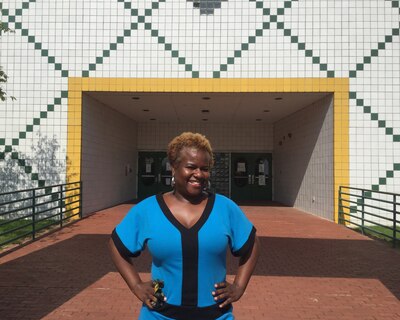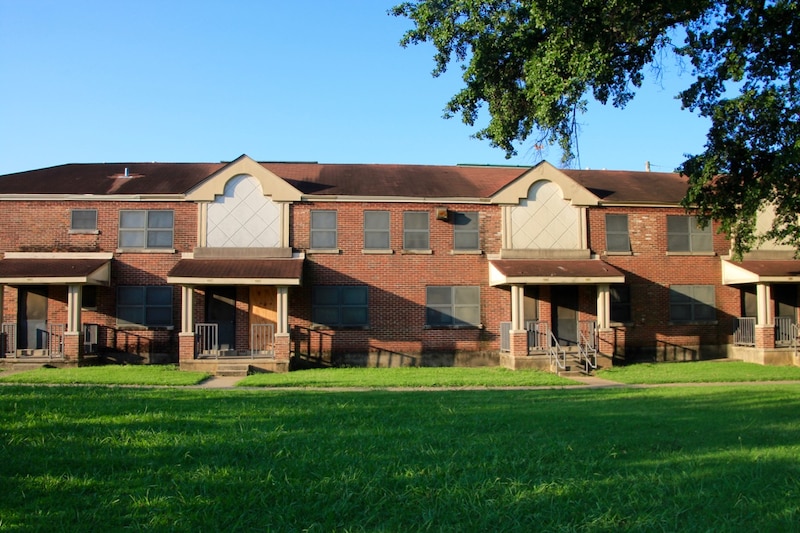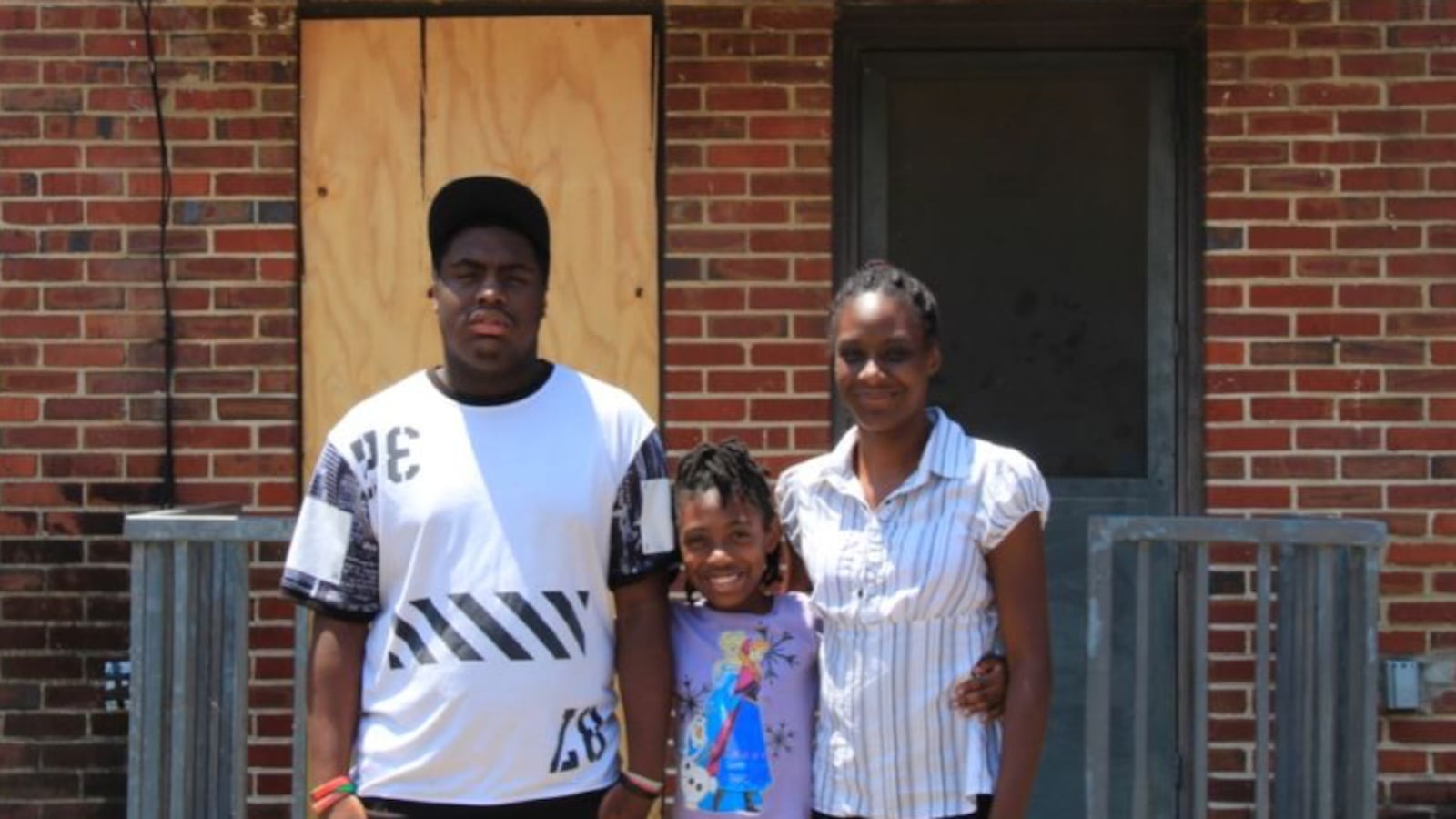In the shadow of historic Booker T. Washington High School, Foote Homes has been home to tens of thousands of students to attend downtown Memphis schools since the 1940s.
But that’s about to change.
The 46-acre development is the city’s last remaining public housing project and is due to close in September to make room for mixed-income housing, forcing the relocation of about 330 students.
The impact on three downtown schools, including the city’s first black public high school under segregation, is uncertain as Shelby County Schools begins its new school year next week. But the back-to-school timing of the transition, combined with confusion about the city’s relocation process and the lack of a school impact study, has school leaders bracing for more enrollment challenges in a district that already struggles to get students registered and starting school on time.
Only weeks before her son was hoping to start his junior year at Booker T. Washington, Foote Homes resident Vanessa Nelson was still trying to figure out how to get a housing voucher to relocate. Asked where her son Elliott would be attending school next year, Nelson was blunt.
“I don’t know,” she said, while walking to a recent neighborhood housing fair.
Many Foote Homes residents still were receiving their housing vouchers in late July, just as Shelby County Schools made its last big push to register for school. Families are supposed to be out by September, a month after the school year starts.
Booker T. Washington High School, where President Barack Obama delivered the commencement address to graduates in 2011, stands to bear the brunt of the relocation impact, along with Downtown and LaRose elementary schools.

Leaders of the 600-student high school, which had an enrollment of 561 last school year, have aggressively tried to address confusion over relocation by calling parents, hosting registration block parties, and keeping the school office open for registration during summer break.
“Even if they have to move and transfer, at least they haven’t missed a lot of school,” principal Alisha Kiner said this week. “We’ve been real pushy in that regard because we don’t want to lose kids.”
The efforts appear to be working. Just days before the first bell rings, registration numbers were actually up over the same time last year. Even so, Kiner expects to lose many Foote Homes students this fall, and she’s talking frequently with administrators at other schools where her kids might end up.
“If we’re going to meet kids, and we know they have issues when they have to move, then we just have to know how to support them. So part of that is not being selfish,” said Kiner, adding that dealing with high student mobility is a regular challenge for Memphis schools.
Shifting priorities
The razing of Foote Homes is part of the city’s decade-long effort to redevelop its South Main Historic District, which lies about a mile away in downtown Memphis. South Main includes a mosaic of shops, restaurants and art galleries anchored by the former Lorraine Motel, where civil rights leader Martin Luther King Jr. was assassinated in 1968. It’s now the home of the National Civil Rights Museum.
Foote Homes stands in stark contrast to the tourist-friendly district area. Built in the 1940s, the 420-unit development features rows of deteriorating brick apartments lining both sides of Danny Thomas Boulevard. Over the years, they’ve housed famous Memphians including civil rights activist Benjamin Hooks and Stax musician Rufus Thomas. Last renovated in the 1990s, the buildings have fallen into disrepair.

The Foote Homes redevelopment plan — which includes the construction of 460 mixed-housing units and amenities such as green spaces and a fitness trail — has been beset by challenges. Earlier work to raze and redevelop several other Memphis housing projects had sapped most of the city’s federal grant money by the time leaders got to Foote Homes. That forced the city to seek additional funding for the $60 million-plus project and has contributed to the local community’s uncertainty about its future.
This spring, residents finally received their 90-day notices to leave the public housing project, but most opted to wait until they had a voucher in hand to start looking for a new place to live. It wasn’t until late July that the last of them had received a voucher.
“We’re not saying they have to be out by any specific date, but we’d like them to be out by September,” said Dorian Jenkins, interim director of the Memphis Housing Authority, adding that demolition will start “as soon as all the families are out.”
Throughout the summer, Foote Homes has been a neighborhood in transition. On a recent sweltering summer day, Housing Authority staff could be seen inspecting empty units and clearing out others while children played outside. Many apartments were still occupied.
Across the street, Streets Ministries has continued to maintain services for Foote Homes kids at its downtown site.
“I think it’s all been pretty muddy,” director Latoya McCutcheon said of the relocation.
“And I don’t want to say that they didn’t do a good job of preparing the families. I just think there was a disconnect between what will actually happen and what you should do to prepare for that transition. Something wasn’t communicated to the point where the residents actually understood that they would have to be out by September. Because of that, a lot of the families are just kind of left in chaos,” she said.
Dropping the ball
The Foote Homes relocation coincided with a change in leadership at the Housing Authority as former director Robert Lipscomb stepped down in late August 2015. Lipscomb had spearheaded the city’s efforts to tear down and redevelop its public housing and had been lauded by school leaders for his organization and communication in previous relocations.
“To his credit, Robert Lipscomb was focused on some of the legacy schools,” school Superintendent Dorsey Hopson said in a June interview on a Funky Politics podcast. “But obviously when he resigned, I don’t think anybody has picked up the ball on that.”
Hopson said Shelby County Schools was largely left out of the Foote Homes planning as the project began to gain traction and relocation deadlines were set. “There was no comprehensive plan,” he said.
Chris Caldwell, whose school board district encompasses Foote Homes and Booker T., expressed surprise that the relocation was moving forward. “It hasn’t come before the board, so I would hope there would be in communication with the district,” he said.

By default, the district has taken on a more reactive role with Foote Homes residents, waiting until they’ve found their new homes before helping register their students for school. “Once they’ve identified where they want to live, it’s our job to help to make sure that they’re ready for Aug. 8,” said spokeswoman Natalia Powers, adding that residents can relocate within a 50-mile radius.
That could further drain the district of students. Shelby County Schools already has thousands of empty seats due to decades of declining enrollment.
Foote Homes resident Tiara Edmond, a mother of two children, said her family was open to a move and a change of schools from KIPP Memphis Collegiate charter schools. But by the end of July when she hadn’t received her housing voucher, she decided to send her kids back to KIPP. Edmond has a car and said she could drive her kids to their current school, no matter where her family ends up living.
Other schools in the Foote Homes community already have been impacted.
Moving Ahead School of Scholars Learning Academy, a K-3 charter school that operated in the Pentecostal Temple Church of God in Christ, closed in June after only one year of operation due to declining enrollment — and the expectation of even fewer students next year. Leaders opted to surrender their charter in hopes of reopening another school in the future to serve low-income families. But their hearts are still in downtown neighborhoods, including Foote Homes.
“The kids were awesome — I loved every moment of it,” said principal Lorene Essex, explaining that the 60-student school and small classes fostered a family-like environment.
”The families were wonderful and loving to work with. I’m going to miss them very much.”


